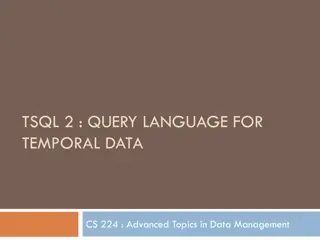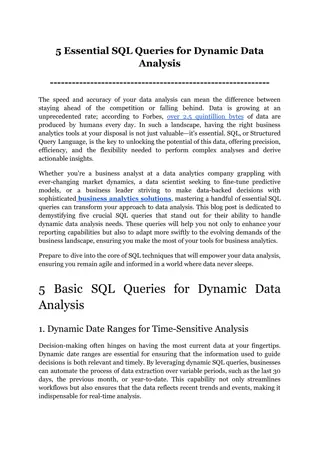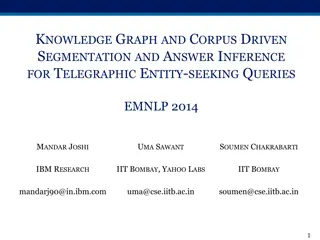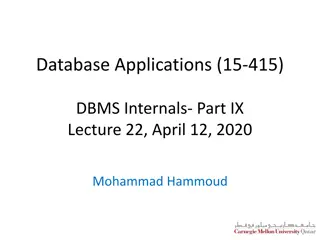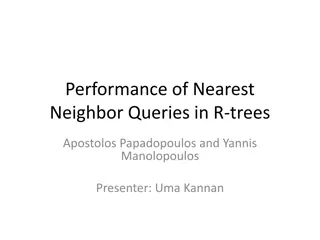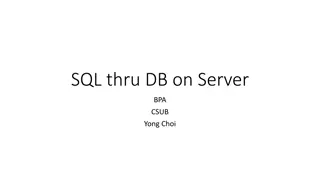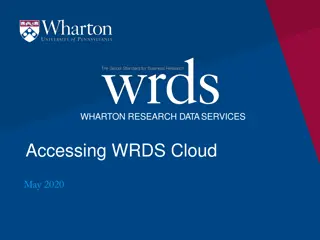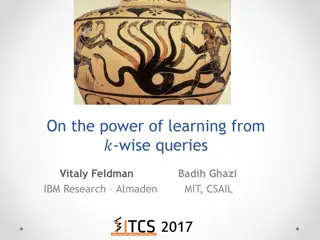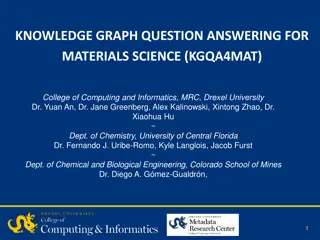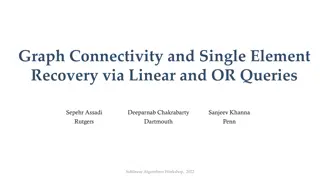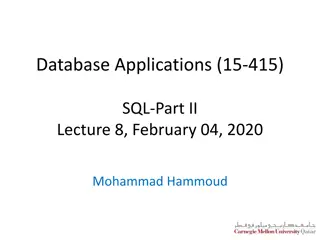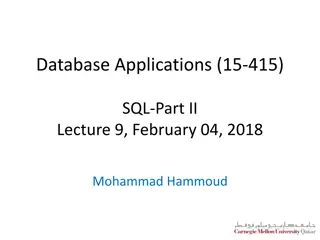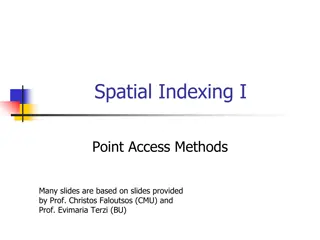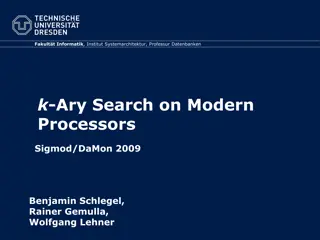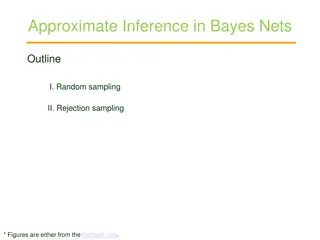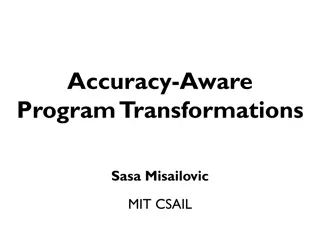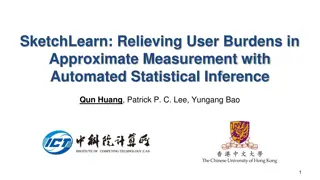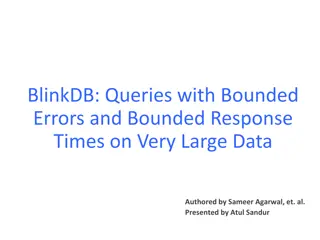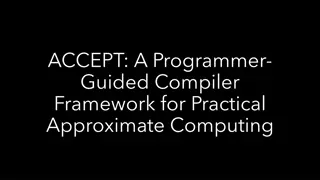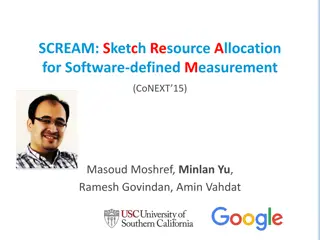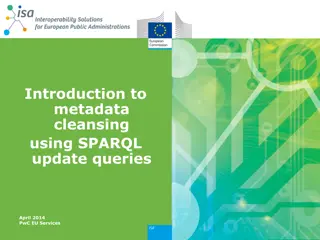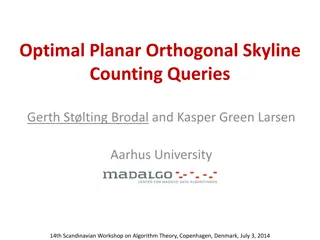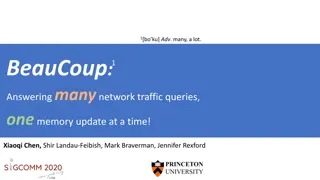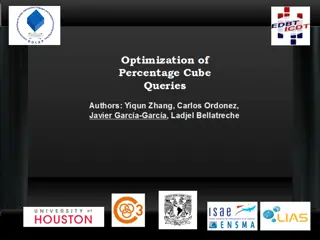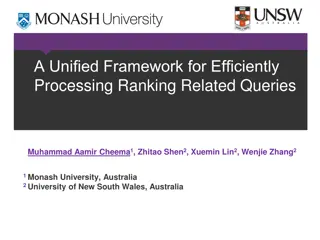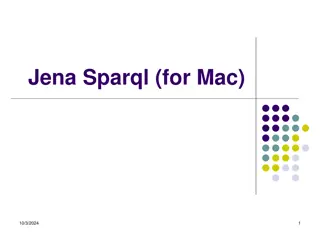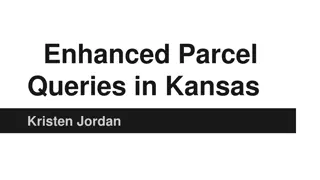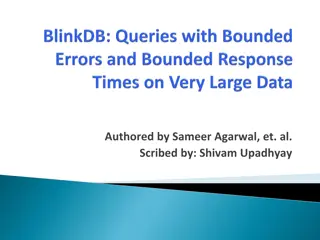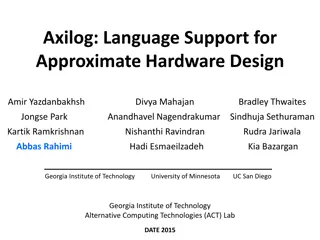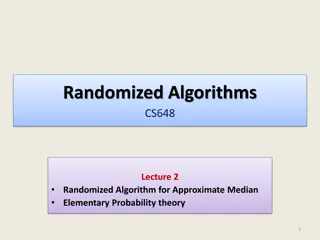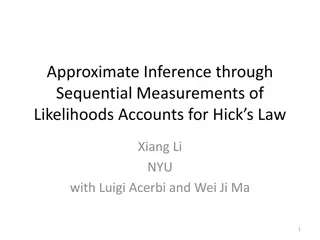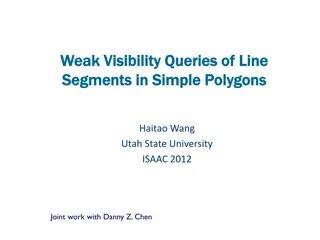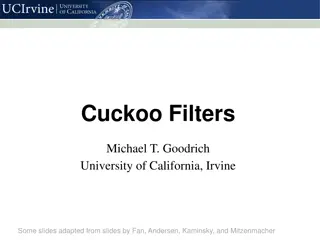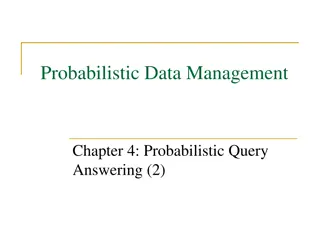WISK: A Workload-aware Learned Index for Spatial Keyword Queries
WISK, a workload-aware learned index that combines spatial and keyword queries to efficiently retrieve objects. It integrates spatial and textual indexes and considers query workload information.
1 views • 17 slides
ARGOS Inventory by Fund Queries Presentation Slides
The presentation slides showcase the ARGOS Inventory by Fund Queries project, featuring detailed information and visuals to help understand the queries and data analysis process. The slides provide insights into inventory management methods based on different funds, highlighting key aspects of the A
1 views • 14 slides
Enhancing Security Definitions for Functional Encryption
This study delves into the realm of functional encryption (FE) against probabilistic queries, highlighting the necessity for improved security definitions to address existing limitations such as counter-intuitive examples and impossibility results. The exploration leads to proposing a new security n
4 views • 20 slides
Understanding Temporal Data Management in TSQL Queries
Explore the realm of temporal data in TSQL queries, delving into the concepts of valid time and transaction time, different types of relations like snapshot and bi-temporal, and the significance of time dimensions in database management. Learn how temporal databases support time-related queries for
6 views • 41 slides
SQL Server Management Studio Tips and Tricks
Explore valuable tips and tricks for optimizing your use of SQL Server Management Studio (SSMS) with shortcuts, formatting queries, object scripting, and quick overviews. Learn practical techniques for running queries efficiently and accessing important options within SSMS. Enhance your workflow and
4 views • 38 slides
5 Essential SQL Queries for Dynamic Data Analysis
Explore the transformative power of SQL with our latest guide, which highlights five critical SQL queries essential for dynamic data analysis. This post covers how these queries can be utilized by business analytics tools to enable data analysts, scientists, and BI professionals to extract actionabl
5 views • 8 slides
Knowledge Graph and Corpus Driven Segmentation for Entity-Seeking Queries
This study discusses the challenges in processing entity-seeking queries, the importance of corpus in complementing knowledge graphs, and the methodology of segmentation for accurate answer inference. The research aims to bridge the gap between structured knowledge graphs and unstructured queries li
0 views • 24 slides
Query Optimization in Database Management Systems
This content covers the fundamentals of query optimization in Database Management Systems (DBMS), including steps involved, required information for evaluating queries, cost-based query sub-system, and the role of various components like query parser, optimizer, plan generator, and cost estimator. I
0 views • 51 slides
Performance of Nearest Neighbor Queries in R-trees
Spatial data management research focuses on designing robust spatial data structures, inventing new models, constructing query languages, and optimizing query processing. This study explores the estimation of query performance and selectivity, specifically in R-trees, for efficient access planning.
1 views • 32 slides
SQL Queries for Database Management
Explore a series of SQL queries for efficient database management, including selecting specific records, sorting data, and counting customers by country. Enhance your SQL skills with these practical examples showcasing various query types and techniques.
0 views • 10 slides
Understanding the Differences Between Web Queries and WRDS-Cloud Queries
Explore the distinctions between web queries and WRDS-Cloud queries, such as the tools used, query limitations, and knowledge requirements. Learn how to access support for WRDS Cloud and enhance your data research skills.
0 views • 5 slides
Exploring the Power of Wise Queries in Statistical Learning
Dive into the world of statistical learning with a focus on the impact of wise queries. Discover how statistical problems are approached, the significance of statistical queries, and the comparisons between wise and unary queries. Explore the implications for PAC learning and uncover key insights in
0 views • 8 slides
Advancements in Knowledge Graph Question Answering for Materials Science
Investigating natural language interfaces for querying structured MOF data stored in a knowledge graph, this project focuses on developing strategies using NLP to translate NL questions to KG queries. The MOF-KG integrates datasets, enabling query, computation, and reasoning for deriving new knowled
0 views • 13 slides
Graph Connectivity and Single Element Recovery via Linear and OR Queries
The content discusses the concepts of graph connectivity and single element recovery using linear and OR queries. It delves into the strategies, algorithms, and tradeoffs involved in determining unknown vectors, edges incident to vertices, and spanning forests in graphs. The talk contrasts determini
0 views • 28 slides
Exploring SQL Queries and Joins in Database Applications Lecture
Discover a comprehensive overview of SQL queries, including nested and deeply nested queries, in the context of database applications. Learn about joining tables, finding sailors who reserved specific boats, handling NULL values, and more in this informative lecture featuring examples and explanatio
0 views • 53 slides
SQL Part II Lecture Summary: Nested Queries, Joins, and Updates for Database Applications
In this SQL lecture, Mohammad Hammoud covers nested queries, insertion, deletion, updates, handling NULL values, join variants, and advanced query techniques. Examples include finding sailors who have reserved specific boats, using nested queries to filter data, and deep nested queries for complex d
0 views • 53 slides
Efficient Spatial Indexing Techniques for Range Queries
Explore spatial indexing methods such as grid file, kd-tree, and quadtrees for efficient range query processing. Learn how these methods partition space, handle multidimensional points, and optimize disk access. Discover the implementation details and search strategies for exact match and range quer
1 views • 56 slides
k-Ary Search on Modern Processors
The presentation discusses the importance of searching operations in computer science, focusing on different types of searches such as point queries, nearest-neighbor key queries, and range queries. It explores search algorithms including linear search, hash-based search, tree-based search, and sort
0 views • 18 slides
Approximate Inference in Bayes Nets: Random vs. Rejection Sampling
Approximate inference methods in Bayes nets, such as random and rejection sampling, utilize Monte Carlo algorithms for stochastic sampling to estimate complex probabilities. Random sampling involves sampling in topological order, while rejection sampling generates samples from hard-to-sample distrib
0 views • 9 slides
Accuracy-Aware Program Transformations for Energy-Efficient Computing
Explore the concept of accuracy-aware program transformations led by Sasa Misailovic and collaborators at MIT CSAIL. The research focuses on trading accuracy for energy and performance, harnessing approximate computing, and applying automated transformations in program optimization. Discover how to
0 views • 20 slides
Automated Statistical Inference for Approximate Measurement Burdens
SketchLearn explores relieving user burdens in approximate measurement through automated statistical inference. The research delves into addressing challenges such as specifying errors, defining thresholds, handling network traffic, and optimizing measurement algorithms. By identifying and mitigatin
0 views • 35 slides
Overview of BlinkDB: Query Optimization for Very Large Data
BlinkDB is a framework built on Apache Hive, designed to support interactive SQL-like aggregate queries over massive datasets. It creates and maintains samples from data for fast, approximate query answers, supporting various aggregate functions with error bounds. The architecture includes modules f
0 views • 26 slides
ACCEPT: A Programmer-Guided Compiler Framework for Practical Approximate Computing
ACCEPT is an Approximate C Compiler framework that allows programmers to designate which parts of the code can be approximated for energy and performance trade-offs. It automatically determines the best approximation parameters, identifies safe approximation areas, and can utilize FPGA for hardware
0 views • 15 slides
Sketch Resource Allocation for Software-defined Measurement in Network Management
Measurement plays a crucial role in network management, especially for tasks like heavy hitter detection and anomaly detection. The focus is on sketch-based measurement, using innovative techniques like Count-Min Sketch to approximate specific queries efficiently. Challenges include limited resource
0 views • 31 slides
Metadata Cleansing Using SPARQL Update Queries
Learn how to transform and cleanse RDF metadata using SPARQL Update queries to conform to the ADMS-AP for Joinup. This tutorial provides essential knowledge on converting metadata for interoperability solutions and the main queries involved. Discover how to ensure your metadata is compliant and read
0 views • 37 slides
Advanced Techniques for Orthogonal Skyline Counting Queries
Advanced techniques for orthogonal skyline counting queries discuss optimal planar solutions, dividing and conquering for topmost point identification, efficient vertical slab counting, succinct data structures for prefix sums and range maxima, upper bounds on degree and multi-slab queries, as well
0 views • 11 slides
Efficient Network Traffic Queries Handling Strategies
Solve network traffic queries efficiently by ensuring constant memory updates and minimal memory access. Implement strategies such as managing multiple data structures for various query types and coordinating queries to optimize packet processing. Explore the coupon collector problem to enhance quer
0 views • 26 slides
Optimizing Queries and Constructing Percentage Cube in Business Intelligence
Presented at ENSMA, this paper introduces optimized strategies for constructing a percentage cube to enhance processing of complex queries in modern business intelligence. It discusses challenges, comparison between percentage queries and percentage cube, and showcases a data cube analysis of car sa
0 views • 21 slides
Unified Framework for Efficient Ranking-Related Queries Processing
The research paper discusses a unified framework focusing on efficiently processing ranking-related queries. It covers dual mapping and ranking, k-lower envelope usage in ranking, top-k queries solutions, and applications like identifying user preferences. The study showcases algorithms, experimenta
0 views • 22 slides
Approximate Hardware Synthesis for Energy-Efficient Designs
The paper introduces an Approximate High-Level Synthesis (AHLS) approach for generating energy-optimized register-transfer-level hardware implementations from accurate high-level C descriptions. This approach considers joint precision and voltage scaling to maximize energy reductions while maintaini
0 views • 20 slides
Understanding Jena SPARQL for Mac and RDF Queries
Jena SPARQL for Mac is a powerful tool for querying RDF graphs using SPARQL. Learn about RDF graphs, models, triples, and how SPARQL queries work. Explore ARQ, a query engine that supports the SPARQL RDF Query language and features multiple query languages. Discover how to install ARQ and execute SP
0 views • 25 slides
Enhanced Parcel Queries in Kansas by Kristen Jordan
Project aims to provide expanded tools and services for statewide parcel queries in Kansas. Background includes the Kansas Data Access and Support Center's existing project and the implementation of a REST web service. Specific goals involve accessing services through desktop and web applications, p
0 views • 20 slides
Understanding BlinkDB: A Framework for Fast and Approximate Query Processing
BlinkDB is a framework built on Hive and Spark that creates and maintains offline samples for fast, approximate query processing. It provides error bars for queries executed on the same data and ensures correctness. The paper introduces innovations like sample creation techniques, error latency prof
0 views • 8 slides
Approximate Computing in Hardware Design: A Comprehensive Overview
Explore the groundbreaking concepts of approximate computing in hardware design, which involves embracing errors to enhance resource efficiency and performance. Delve into topics such as avoiding worst-case design, criteria for approximate HDL, safety in hardware, and relaxing accuracy requirements
0 views • 31 slides
Randomized Algorithms for Approximate Median with Elementary Probability
This content covers a lecture on a randomized algorithm for finding an approximate median element using elementary probability theory. It discusses the importance of insight and basic probability in designing and analyzing such algorithms. The lecture presents a simple probability exercise involving
0 views • 25 slides
Sequential Approximate Inference with Limited Resolution Measurements
Delve into the world of sequential approximate inference through sequential measurements of likelihoods, accounting for Hick's Law. Explore optimal inference strategies implemented by Bayes rule and tackle the challenges of limited resolution measurements. Discover the central question of refining a
0 views • 29 slides
Weak Visibility Queries of Line Segments in Simple Polygons - Overview
This information discusses weak visibility queries of line segments in simple polygons, focusing on topics such as visibility of line segments, visibility polygons, visibility graphs, and related previous work on preprocessing and data structures for visibility queries in simple polygons.
0 views • 26 slides
Investigating Anomalous DNS Queries: A Case Study from DNS-OARC 25, Dallas
The exploration uncovers a surge in AAAA queries, leading to a 20% spike in billing. Through meticulous analysis, patterns emerged showing excessive AAAA queries for specific nameservers lacking AAAA glue. Remedies included reaching out to providers and deploying temporary fixes. The resolution invo
0 views • 13 slides
Overview of Bloom Filters and Succinct Data Structures
Bloom filters and succinct data structures are efficient data structures used for set-membership tests and approximate queries. Bloom filters offer compact storage for set membership with a trade-off in accuracy, while succinct data structures aim to balance high performance, low space cost, and sup
0 views • 22 slides
Understanding Probabilistic Query Answering and Group Nearest Neighbor Queries
This chapter delves into probabilistic query types, focusing on probabilistic group nearest neighbor queries. Explore the definitions, processing techniques, and applications of such queries. Learn how probabilistic data management plays a crucial role in uncertain databases, spatial queries, and mo
0 views • 34 slides



